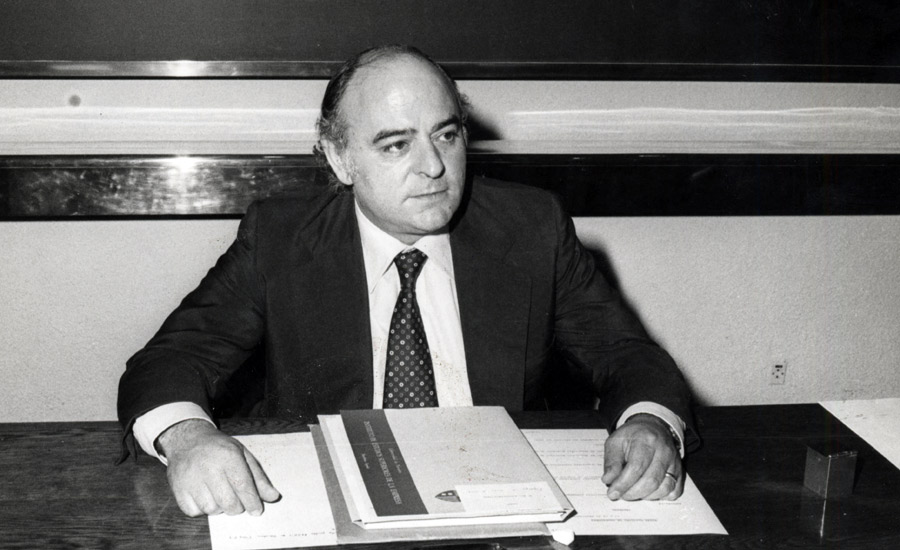
In business we often find ourselves asking questions like: “in hindsight, was that the right decision? Is this manager trustworthy? And what about this employee, colleague, supplier?”
When running a business, trust is always crucial, and the consequences of our actions go way beyond the economic and the short term.
Professor Juan Antonio Pérez López (1934 -1996), former Dean of IESE and Professor of Organizational Behavior, developed a theoretical framework for personal action in organizations. In addition to this he also taught many generations of business people and business owners. On the 20th anniversary of his death, IESE faculty paid tribute to his legacy.
Professors Rafael Andreu, Josep Maria Rosanas and Miguel Ángel Ariño took part in a celebratory event at the IESE campus in Barcelona, titled “Excellence in Decision Making for Business.” All three professors have experience working alongside Pérez López, and continue to develop his teachings as well as their practical application.
Tribute was also paid by the Dean of IESE, Jordi Canals and by Professor Pedro Nueno – who was associate dean during Pérez López’s tenure and collaborated closely with him.
The Human Side of Decisions
With a PhD in Business Administration from Harvard Business School, Pérez López was a scholar of human action theories in organizations. Economic, sociological, anthropological and ethical considerations in the decision-making process formed a key part of his research.
Canals highlighted Pérez-López’s passion for teaching and research, along with the great contribution that he made developing better decision making in business leaders and fostering an aspiration for excellence.
IESE Dean also stressed the ongoing relevance of his teachings in today’s global and uncertain world.
“Thanks to Juan Antonio Pérez López, making business decisions today can be more humane, more complete and more aligned to the company’s reality.”
Professor Andreu underscored the need to remember that executive decisions make an impact that goes far beyond the purely economic.
“People learn from every interaction, and from this they change or adapt their behavior accordingly.”
Pérez-López, he said, defined this reality as “evaluative learning.”
Every business decision and every action contributes to the short and long term development – or deterioration – of the company.
Moreover, decisions affect people for better or for worse, which is why decision making needs to be ethical, said Andreu.
Fostering an ecosystem in which the best is brought out in every single person should be a key objective for all organizations.
“It’s impossible to obtain just economic results,” said Andreu. “Future results are conditioned by every directive decision – so we need to think about the future impact of executive decisions.”
Global Vision and Holistic Management
Professor Ariño highlighted the “global vision” of Pérez López’s decision-making model.
“A business decision cannot be right from one perspective and wrong from another. It can’t be right finance-wise and wrong for operations. Nor can it be good for strategy and bad from an ethical perspective. A business decision is a unique action that affects the organization as a whole,” said Ariño.
Business decisions affect more than just the company. Business decisions affect the trust and confidence of all directors and leaders in the company.
“When making a decision, directors should consider the detrimental or positive effect it will have on the trust and confidence placed in them by the rest of the organization. Because when a company lacks trust, it is near impossible to move forward.”
The Harvard Connection
Pérez López developed his theories based on groundwork done by Harvard Business School Professors Robert Newton Anthony, John Dearden and Richard F. Vancil in formal and informal incentive systems.
Professor Rosanas explained that formal and informal aspects are “decisive,” both having real consequences and direct effects on employees, the company itself and stakeholders.
“Juan Antonio Pérez López constructed a solid intellectual edifice which has created schools and universities around the world. We have the responsibility to continue his intellectual legacy because it still has so much potential,” said Rosanas.
A Key Player in the History of IESE
Juan Antonio Pérez López joined IESE in 1961 and was the dean from 1979 to 1984.
In his address, Nueno recalled the tough times in which Pérez López led IESE, in a politically and socially unstable country with serious economic challenges.
During his tenure, he launched the international section of the MBA in Barcelona and consolidated IESE’s activity in Madrid with leadership programs and the start of the part-time Executive MBA.
Nueno also paid tribute to Pérez López as a pioneer in making corporate social responsibility a core aspect of any company’s mission.
He cited Pérez López remarks on Milton Friedman and Pope John Paul II’s visits to IESE in 1982. “We should integrate the thoughts of these two people who visited Barcelona: The economic insight of this Nobel Prize winner and the social teachings of the Pope.”